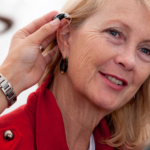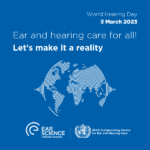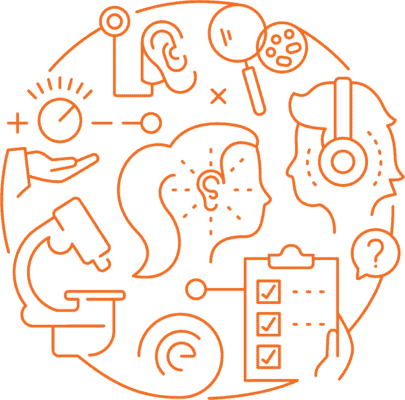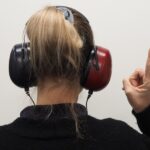Senior Implant Audiologist Ronel Chester-Browne will share with us her knowledge and insights into Cochlear Implants. This marvelous Australian invention truly changes lives and now days Cochlear Implants are routinely recommended for when hearing aids are just not enough.
In this episode, you will learn
1.00 | What are cochlear implants? What are the differences between a hearing aid and an implant?
2.04 | Who might get a hearing implant?
3.28 | How has the technology and candidacy changed over the last 30 years?
5.00 | Are hearing implants just for children?
6.00 | How is technology expanding the options for remote adjustments & telehealth?
7:35 | How would I know if I might be a candidate for a cochlear implant?
10.13 | What is the latest research on hearing implants? Why do only 10% of people who need a cochlear implant have one?
13.58 | How to find out if a cochlear implant might be right for you or your loved one.
16.25 | What motivates Ronel in her work as an implant audiologist?
17.38 | Ear Science Clinic Mentor Service, to match candidates with someone who has gone through the journey
20.00 | Key take-aways
This podcast provides information of a general nature and does not constitute medical advice.
VIEW TRANSCRIPT OF THIS EPISODE
Resources mentioned
Jayakody DMP, Almeida OP, Speelman CP, et al. Association between speech and high-frequency hearing loss and depression, anxiety and stress in older adults. Maturitas. 2018;110:86-91.
Jayakody DMP, Friedland PL, Eikelboom RH, Martins RN, Sohrabi HR. A novel study on association between untreated hearing loss and cognitive functions of older adults: Baseline non-verbal cognitive assessment results. Clinical otolaryngology : official journal of ENT-UK ; official journal of Netherlands Society for Oto-Rhino-Laryngology & Cervico-Facial Surgery. 2018;43(1):182-191.
Galvin K, Sucher CM, Bennett RJ, Ebrahimi-Madiseh A, Crosland P, Eikelboom RH. Willingness to consider and to pay for a variety of telehealth services amongst adult hearing clinic clients. Int J Audiol. 2022 Feb 22:1-9. doi: 10.1080/14992027.2022.2039965. Epub ahead of print. PMID: 35191802.
Test your hearing aid (Hearing Aid Check)
“90% of people who need a Cochlear Implant don’t have one” | Looi V, Bluett C, Boisvert I. Referral rates of postlingually deafened adult hearing aid users for a cochlear implant candidacy assessment. International Journal of Audiology. 56:919-925; 2017.
Ebrahimi-Madiseh A, Eikelboom RH, Bennett RJ, Upson GS, Friedland PL, Swanepoel W, Psarros C, Lai WK, Atlas MD. What Influences Decision-Making for Cochlear Implantation in Adults? Exploring Barriers and Drivers From a Multistakeholder Perspective. Ear Hear. 2020 Nov/Dec;41(6):1752-1763. doi: 10.1097/AUD.0000000000000895. PMID: 33136648.
Glossary of terms
14.13 | “Ski Slope” hearing Loss – This is when a person has very good low frequency hearing and it gradually drops towards the high frequencies. In these cases they have limited or no high frequency hearing.
4.13 | Residual hearing – The hearing that is still present inside the ear, without the use of amplification. This can also refer to the hearing that is still present following a cochlear implant, when no amplification devices are worn. This is what we measure when we do a hearing test without any amplification devices on, just through the headphones.
4.13 | Low frequency hearing loss – A hearing loss in the low tones that provide access to low pitch speech sounds, eg /aa/ / oo/ /mm/, in other words, the deeper tones.
4.45 | Single sided deafness – This is when a person has normal hearing in the one ear and a severe to profound hearing loss (very limited hearing) in the other ear.
About Ronel Chester-Browne
Ronel has been involved in Cochlear Implantation for the last 28 years. Ronel has been working at the Ear Science Institute, Ear Science Implant Clinic, as Clinical Coordination and Senior Implant Audiologist for the last 11 years. She became a member of the Pretoria Cochlear Implant Program in South Africa in 1993. Her experience includes complex audiological assessments, implant candidacy assessments, device activation and management, programming and rehabilitation of cochlear implant devices.
She is very involved in education and training of university students and other professionals in the field of implantable hearing devices and has been involved in several research projects.
More information on Hearing Implants
Research to improve the reliability of cochlear implants
International Cochlear Implant Day
Is a cochlear implant right for you?






